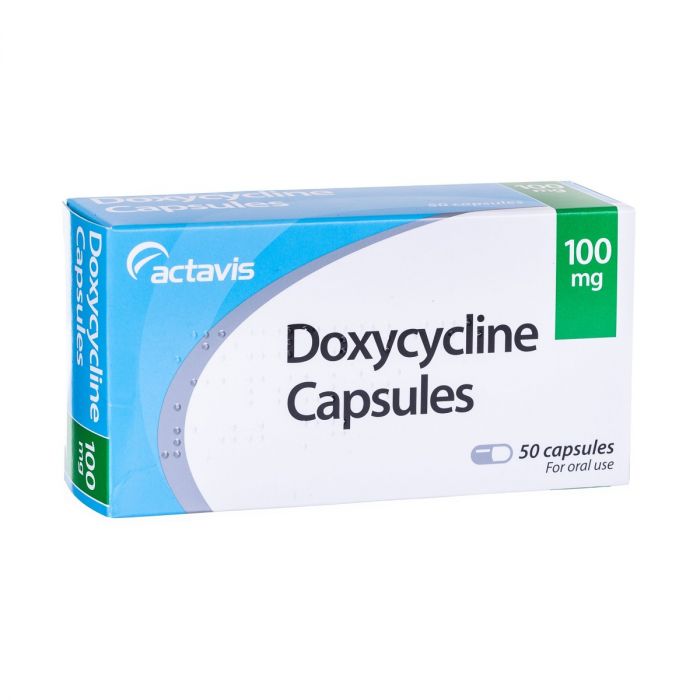Doxycycline
- Treats Chlamydia
- 1 Week course
- Treats men and women
Please note brand received may vary
sourced in the UK
order before 2pm
UK based pharmacies
-
What is Doxycycline?
Doxycycline is an antibiotic used to treat a wide variety of bacterial infections. It belongs to a group of medicines called tetracycline antibiotics.
You cannot buy Doxycycline capsules unless they have been prescribed for you.
What is Doxycycline used to treat?
This antibiotic provides effective treatment for a number of bacterial infections.
Doxycycline is recommended as the primary treatment for chlamydia due to the decreased chance of bacterial resistance.
Chlamydia treatment with this medicine normally consists of taking 2 capsules daily (14 capsules in total) over a period of 7 days. Doxycycline is also used to treat gonorrhoea and other sexually transmitted infections.
Furthermore, Doxycycline can be used to treat or prevent various other types of infections, including:
- Tick fever
- Travellers’ diarrhoea
- Ear infections
- Malaria
- Kidney and bladder infections
- Skin infections
- Respiratory infections
It is also prescribed to treat some cases of acne.
Why is Doxycycline prescribed to treat chlamydia?
Clinical studies have shown that Doxycycline is highly effective at treating the symptoms of chlamydia.
If taken properly, Doxycycline can normally treat chlamydia in just 7 days.
How does Doxycycline work for chlamydia?
Tetracycline antibiotics like Doxycycline work to treat infections by stopping the harmful bacteria from producing the proteins they need to survive and spread in your body.
By stopping these essential proteins from being produced, the bacteria cannot function in the body and your immune system is able to fight off the infection.
Who can use Doxycycline?
This antibiotic should only be taken by adults and children who are over 12 years of age.
Inform your doctor if you have any of the following, as Doxycycline may not be suitable for you:
- Kidney problems
- Liver problems or you are taking any medication that affects the liver
- You have had an allergic reaction to Doxycycline or other medicines in the past
- It is likely you will be exposed to strong sunlight/ultraviolet light
- Myasthenia gravis
- Inflamed food pipe (oesophagitis)
- Porphyria
- Systemic lupus erythematosus
Doxycycline can stain developing teeth and bones. Therefore, women who are pregnant or breastfeeding should not take this medication. For the same reason, it should not be given to anyone under the age of 12.
Can you buy Doxycycline over the counter?
Doxycycline is not for sale over the counter. This medication must be prescribed by a health professional.
Can you buy Doxycycline online in the UK?
You can buy Doxycycline online from regulated pharmacies like Medicine Direct. However, before you can order a prescription medicine like this one, you will need to fill out an online questionnaire to make sure it is suitable for you. One of our registered prescribers will review the answers you provide and assess your condition to ensure Doxycycline is the right medicine for you to take.
If you order by 2pm, we can also provide next day delivery.
Do not order any medication online unless it is from a registered UK pharmacy.
Doxycycline alternatives
Azithromycin is the most commonly prescribed alternative treatment for chlamydia if Doxycycline is not suitable for you. In most cases, you will be instructed to take one dose of Azithromycin to treat chlamydia.
-
Doxycycline Dose
The table below shows the usual recommended doses for adults to treat the following conditions:
Condition
Dose
Chlamydia
100mg twice a day for 7-10 days
Your doctor may prescribe you a different dose than the ones listed here. It is very important that you always take the exact dose your doctor has prescribed for you.
Do not stop taking this antibiotic until your course of treatment is complete, even if you start to feel better before this.
How to take Doxycycline
- Swallow Doxycycline capsules whole with a drink of water.
- Doxycycline can be taken with or without food, but you should try to take the capsules at the same time each day. If you have an upset stomach, try taking the medicine with a meal.
- Take the capsules while standing or sitting up straight. Do not lie down for at least half an hour after taking Doxycycline; this will allow the medicine to move to the stomach as quickly as possible and prevent oesophageal irritation.
- If you are taking Doxycycline to treat an STI, do not have sex until you know that the infection has cleared.
Always take your medicine exactly as your doctor has told you. Read the patient information leaflet before you start taking Doxycycline. Here you will find comprehensive instructions.
-
Doxycycline Side Effects
The most common side effects of Doxycycline include:
- Headaches
- Nausea and vomiting
- Sensitivity to sunlight
More information on side effects can be found in the patient information leaflet. Read this for a comprehensive list of known side effects.
-
Doxycycline Warnings and Drug Interactions
If you are taking any other medicines, you should also tell your doctor as certain medications interact with Doxycycline.
Be sure to inform your doctor if you are taking any of these medicines before you start to use Doxycycline.
Pregnancy and breastfeeding
Doxycycline is not recommended during pregnancy or breastfeeding. Always talk to your doctor if you are pregnant, breastfeeding or planning to conceive before taking any medication.
You can find additional information on the BUMPS website.
-
Doxycycline Ingredients
The main active ingredient within this medicine is: Doxycycline Hyclate
For a full list of the inactive ingredients, please read the Summary of Product Characteristics.
-
How much does it cost to buy Doxycycline online in the UK?
Dose Quantity Buy Online UK Price Doxycycline 100mg 14 capsules (1-week course) £16.99 -
What should I do if Doxycycline does not clear chlamydia?
You should take another Chlamydia test after your treatment course. If you are still testing positive, your doctor is likely to extend the treatment length or prescribe an alternative treatment option.How long does Doxycycline take to work?
As a chlamydia treatment, Doxycycline should have cleared your symptoms within the seven days you take the medicine. If you are taking it for another problem, it may take more or less time than this. Whatever you are taking Doxycycline for, it is important that you continue with your course of treatment for as long as your doctor tells you.How powerful is Doxycycline?
Doxycycline is a broad-spectrum antibiotic, meaning it provides effective treatment against a number of bacterial infections. It is a powerful antibiotic that gets to work quickly. Your doctor will prescribe you the appropriate dose depending on the condition you are being treated for. Some infections require higher doses of this medicine than others.Why shouldn’t I lie down after I’ve taken it?
Lying down after taking this capsule can irritate the oesophagus, so you should remain standing or sitting up straight for at least 30 minutes after taking Doxycycline. Do not take this medicine right before going to bed.Can Doxycycline stain my teeth?
Doxycycline can stain teeth due to building up in growing bones and teeth and binding to calcium. However, this only occurs in developing bones and teeth, which is why children under 12 should not take this medicine. It is also not suitable for pregnant or breastfeeding women for the same reason.Can I catch chlamydia again from my partner?
If your partner tests positive for any STI, it is important that they also receive medical treatment. Do not have sex until you have both been retested to ensure that Doxycycline has worked to kill the infection.Is it okay to drink alcohol when taking Doxycycline?
Do not consume alcohol while taking this medication as it can stop Doxycycline from working effectively.Why do I need to avoid sunlight while taking it?
One of the common side effects of Doxycycline is that it can make your skin sensitive to sunlight. This may cause unpleasant symptoms like redness, sunburn, itching or a skin rash. For this reason, you should avoid overexposure to sunlight, wear sunscreen when you do go out and avoid UV light, such as sunbeds.Can Doxycycline aggravate your stomach?
You can take Doxycycline with or without food, but if your stomach is upset, try taking the capsules with a meal or a glass of milk. Talk to your doctor if this feeling persists.Can I get thrush while using Doxycycline?
It doesn’t affect everyone, but sometimes you can get thrush while taking antibiotics like Doxycycline. This is because the medicine kills the natural bacteria that helps to stop you from getting thrush. If you notice any thrush symptoms occurring, speak to your doctor or pharmacist for guidance on what to do.Can I have sex during my treatment?
No, chlamydia can be passed through unprotected sex, anal and oral sex. It is important that you refrain from having sex during your 7-day treatment period. You should also not have sex until you have tested negative for chlamydia.When can I have sex again?
After your 7-day treatment period, you should take another chlamydia test to ensure that the treatment has worked. You should only have sex again when you have received a negative test result.Does Doxycycline treat chlamydia in both men and women?
Yes, Doxycycline can be used to treat chlamydia in both men and women. It is a recommended chlamydia treatment for anyone over the age of 12.Can Doxycycline cure chlamydia?
Doxycycline will not cure chlamydia; it will only clear a current infection of chlamydia. You can still be re-infected with chlamydia if coming into contact with the infection through a sexual partner.How will I know when chlamydia is gone?
Just because you are no longer experiencing symptoms does not mean that your chlamydia has cleared as it can sometimes display no symptoms. The best way to be sure your chlamydia has cleared is to take another test that will display a negative or positive result.Can Chlamydia be resistant to Doxycycline?
Doxycycline is considered to be an effective treatment when clearing chlamydia. Doxycycline will never offer a 100% guarantee at clearing chlamydia, but there is no known resistance between chlamydia and Doxycycline. If your infection does not clear after the course, it is highly likely that you will be prescribed a different medicine.What is the Doxycycline dosage for Chlamydia?
The typical dose of doxycycline when treating chlamydia is 100mg twice daily for 7 days.
Medically Reviewed by: Hussain Abdeh MPharm: 2211840
Updated on: 27/08/2021
This content has been written by Hussain Abdeh and has been medically reviewed by Sonia Khan
Hussain Abdeh
MPharm: 2211840
UK registered pharmacist
How it works - get your medicine in 3 simple steps
- 1 Choose your treatment Select the treatment or medication you need and answer a few questions online regarding your condition.
- 2 Online consultation A UK based doctor registered with the GMC will review your questions and assess your suitability for the medication.
- 3 Receive your delivery If approved, your medication will be dispensed from a UK based pharmacy.







